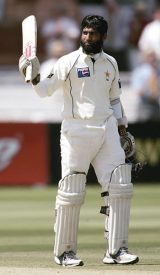The regular Monday column in which Steven Lynch answers your questions about (almost) any aspect of cricket:

|

Mohammad Yousuf has scored at an average of 83.38 in eight Tests since his conversion to Islam
© Getty Images
|
|
Has there been much of a difference in his batting average since Yousuf Youhana converted from Christianity to Islam and changed his name to Mohammad Yousuf? asked Ashley Connick
Mohammad Yousuf converted to Islam last September, at which time his average was a healthy 47.46 from 59 Tests. In eight matches since, though, he has averaged 83.38, and raised his overall average to 52.00. That includes his two double-centuries against England, plus innings of 173 and 126 (and 97) against India. Yousuf puts his improvement down to the change: "Everything is because of Allah, we can't do without him. I converted and after that my performances have improved because of the discipline. I pray five times a day. When you are praying you are very disciplined ... I haven't changed my way of playing, or the way of my game, just the way of my life." Andrew Miller looked further into the matter
in an article on Cricinfo last week.
What is the highest number of individual centuries in a single innings? asked Adam Scholem from the United States
There have been two Test innings which included five individual centuries. The first was Australia's 758 for 8 declared
at Kingston in 1954-55. After West Indies made 357, the Aussies slumped to 7 for 2 ... but then Colin McDonald made 127, Neil Harvey 204, Keith Miller 109, Ron Archer 128 and
Richie Benaud 121 (he reached his hundred in 78 minutes, the third-fastest in all Tests). Australia went on to win by an innings despite
Clyde Walcott scoring two hundreds in the game, taking his tally to a record five in the series. The second instance came
at Multan in August 2001, when five players passed 100 - but none passed 110 - as Pakistan made 546 for 3 declared against Bangladesh. The centurymakers were Saeed Anwar (101), Taufeeq Umar (104), Inzamam-ul-Haq (105 retired hurt), Yousuf Youhana (102 not out) and Abdul Razzaq (110 not out). In first-class cricket the record for one innings is six hundreds, scored by Holkar during their 912 for 8 declared against Mysore in the Ranji Trophy semi-final
at Indore in 1945-46.
We were having a discussion about Narendra Hirwani's famous 16-wicket debut. We spotted that six of his wickets were to stumpings by Kiran More - five of them in the second innings. Is that a record? asked Amit Jindal from the United States
Kiran More's five stumpings in the second innings of that Test against West Indies
at Madras in 1987-88 is indeed a record for all Test cricket, as is his total of six in the match. Australia's Bert Oldfield set the previous mark with four stumpings in an innings against England
at Melbourne in 1924-25. The first-class record is six stumpings in an innings, by Worcestershire's
Hugo Yarnold (later a Test umpire) against Scotland
at Dundee in 1951, while Kent's
at The Oval in 1911.
I can remember a picture of a print featuring Arthur Shrewsbury in a field of poppies that Wisden Cricket Monthly published many years ago. Can you tell me something about this picture and who painted it? As an adult I would like to own a copy, as it is all the more moving now knowing Shrewsbury's personal history, asked Duncan Cameron-Mitchell

|

Arthur Shrewsbury in a field of poppies
© Gerry Wright
|
|
The print you're talking about was one of several in a similar style painted by the artist Gerry Wright. They were collected together in a book, with text by David Frith, called
Cricket's Golden Summer, which was published by Pavilion Books in 1985. You might be able to track down a copy on a site like www.bookfinder.com. Some of the prints, including the Shrewsbury one, were issued in a limited-edition set around the same time: you might be able to find those at one of the several bookdealers who specialise on cricket books and ephemera.
Arthur Shrewsbury was one of England's first great batsmen - he was the first man to reach 1000 runs in Test cricket, in 1893 - but in 1903, aged only 47, he shot himself, convinced that he had a terminal illness.
I was watching the highlights of the 1974 Old Trafford Test between India and England on TV the other day. At one point the commentator mentioned that "the day before at The Oval" Robin Jackman had scored an all-run six - "and no overthrows". Can you tell me some more about this? asked Gulu Ezekiel from Delhi
The match in question was Surrey's Sunday League (40 overs) game against Yorkshire
at The Oval on June 9, 1974.
Wisden just says that Intikhab Alam and Robin Jackman "both hit boldly and even ran a six" as they rescued Surrey from 43 for 6 with a stand of 74. I can't find any more details, but I do vaguely remember mention of the incident at the time. I think that the whole of the vast Oval outfield was in use, but the pitch for this game was at the edge of the square near the gasholders, leaving a huge boundary on the Harleyford Road side of the ground. Jackman cut a ball out towards the boundary and they ran six - I can only assume the fielders thought the ball was going to reach the fence then had to chase after it when it didn't!
What is the highest score by a No. 11 batsman in a Test? asked Saeed Abbasi from Pakistan
This record changed hands quite recently. For more than 30 years the record was held by
Richard Collinge, the New Zealand fast left-arm bowler, who made 68 not out against Pakistan
at Auckland in 1972-73, during a record tenth-wicket partnership of 151 with Brian Hastings. But his record was finally broken in December 2004 by
Zaheer Khan, who made 75 for India against Bangladesh
at Dhaka. Zaheer even outscored Sachin Tendulkar - who made 248 not out - in a last-wicket stand of 133. For a list of the highest scores from each batting position in Tests,
click here.
Steven Lynch is the deputy editor of The Wisden Group. For some of these answers he was helped by Travis Basevi, the man who built Stats Guru. If you want to Ask Steven a question, contact him through our feedback form. The most interesting questions will be answered each week in this column. Unfortunately, we can't usually enter into correspondence about individual queries.

